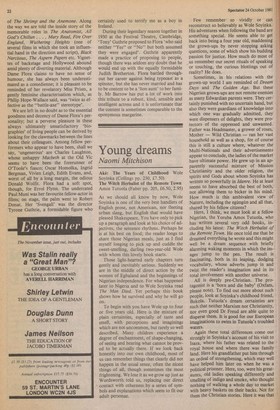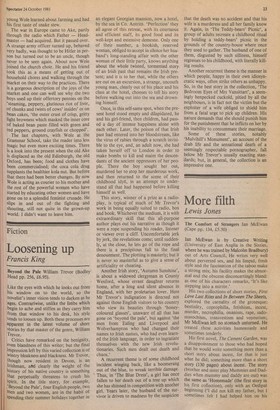Young dreams
Naomi Mitch ison
Ake: The Years of Childhood Wole Soyinka (Collings pp. 230, £7.50) The Witch Herbalist of the Remote Town Amos Tutuola (Faber pp. 205, £6.50, 2.95) As we should all know by now, Wole Soyinka is one of the very best handlers of English prose, not American, nor fleeting urban slang, but English that would have pleased Shakespeare. You have only to pick up a paragraph and look at his choice of adjectives, the sentence rhythms. Perhaps he is at his best on food; the reader longs to share those Nigerian meals, just as I find myself longing to pick up and cuddle the sweet-smelling, darling two-year-old Wole with whom this lovely book starts.
Those light-hearted early chapters turn gently and inevitably serious. Suddenly we are in the middle of direct action by the women of Egbaland and the beginnings of Nigerian independence. For what happened later to Nigeria and to Wole Soyinka read The Man Died. Yet perhaps this book shows how he survived and why he will go on.
To begin with you have Wole up to four or five years old. Here is the mixture of plain certainties, especially of taste and smell, with perceptions and imaginings which are not uncommon, but rarely so well described. Many children experience a degree of enchantment, of shape-changing, of seeing and hearing what cannot be proved to be actually there. If we look back honestly into our own childhood, most of us can remember things that clearly did not happen in the usual sense, often the nicest things of all, though sometimes the most frightening. We lose it as we grow up just as Wordsworth told us, replacing our direct contact with otherness by a series of symbols and explanations which seem to fit our adult personae. Few remember so vividly or can reconstruct so believably as Wole Soyinka. His adventures when following the band are something special. He seems able to get back into being a four year old, maddening the grown-ups by never stopping asking questions, some of which show his budding passion for justice. How much do most of us remember our secret rituals of speaking or touching, the curious blottings out of reality? He does.
Sometimes, in his relations with the grown-up world I am reminded of Dream Days and The Golden Age. But these Nigerian grown-ups are not remote enemies as many Edwardian parents were. They certainly punished with no uncertain hand, but also they were guardians of knowledge into which one was gradually admitted, they were dispensers of delights, they were protectors of the oppressed and unwanted. Father was Headmaster, a grower of roses, Mother — Wild Christian — ran her vast household as well as a shop, for of course this is still a culture where, whatever the Multi-Nationals and their advertisements appear to conclude, the ladies of the market have ultimate power. He grew up in an apparently successful mixture of Mission Christianity and the older religion, the spirits and Gods about whom Soyinka has written so powerfully in Idanre. He at least seems to have absorbed the best of both, not allowing them to bicker in his mind. How much is this ambivalent view of Nature, including the egiingim and all that, shared by his fellow citizens?
Here, I think, we must look at a fellow Nigerian, the Yoruba Amos Tutuola, who has written several very odd books, including his latest: The Witch Herbalist of the Remote Town. He once told me that he dreamed everything he wrote and this might well be a dream sequence with briefly alarming waking moments in which the images jump to the pen. The result is fascinating, both in its leaping, dodging vocabulary, whose adverbs jump in and twist the reader's imagination and in its total involvement with another universe.
All is deeply pre-Christian. The protagonist is a 'born and die baby' (Oxfam, please note). To find out more about such people, look at Soyinka's childhood friend, Bukola. Tutuola's dream certainties are such that neither Marxism nor Christianity, nor even good Dr Freud are able quite to disperse them. It is good for our European imaginations to swim in Tutuola's troubled waters.
Again these total differences come out strongly in Soyinka's account of his visit to Isara, where his father was related to the royal house and where there was family land. Here his grandfather put him through an ordeal of strengthening, which may well have helped him later on when he was a political prisoner. Here, too, were his greataunts, old ladies speaking differently and 'smelling of indigo and smoke, who thought nothing of walking a whole day to market with heavy baskets on their backs. Not for them the Christian stories. Here it was that Young Wok learned about farming and had his first taste of snake stew.
The war in Europe came to Ake, partly through the radio which Father — Headmaster — had acquired. But it passed over. A strange army officer turned up, behaved very badly, was thought to be Hitler in person but turned out to be an uncle, though never to be seen again. About now Wole joined the church choir. He and his friend took this as a means of getting out of household chores and walking through the market on their way to the practices. There is a gorgeous description of the joys of the market and one can well see why the two boys used up their offertory pennies on the 'steaming, peppery, glutinous riot of liver, of chunks and twists of cows' insides' or on bean cakes, 'the outer crust of crisp, gritty light browness which masked the inner core of baked bean paste filled with green and red peppers, ground crayfish or chopped'.
The last chapters, with Wole at the Grammar School, take the reader into less magic but even more exciting times. There is a look into the present when the old Ake is displaced as the old Edinburgh, the old Oxford, has been; food and clothes have been commercialised; the coca cola drug supplants the healthier kola nut. But before that there had been better changes. By now Wole is acting as courier to his mother and the rest of the powerful women who have started by educating other women and have gone on to a splendid feminist crusade. He slips in and out of the fighting and shouting, still not quite in the grown-up world. I didn't want to leave him.



































 Previous page
Previous page